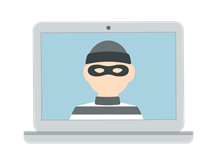Staying safe from scammers
You can help protect yourself from online fraud by knowing what to look out for.
If something feels off or too good to be true, then it probably is.
Email threatening you with prison if you don’t do what it says? Why would that happen in real life? Would the police send you an email?
Get a text to arrange a parcel delivery but you haven’t ordered anything? Watch out for that kind of thing.
Spotting the scams
Scams usually take the forms of so-called phishing, smishing and vishing.

Phishing
Based on internet spelling for someone ‘fishing’ for your information. This could be a scam email that pretends you’ve won something or inherited money, or claims to be from your bank, an online retailer, and so on.
You’ll often be asked to click a link that will give the scammer access to your information, or install malware on your phone or laptop.
Some are easy to spot because they’re unsophisticated, but others are harder to spot.
- Check the sender’s email address to see if it looks peculiar.
- Look for poor quality images, bad spelling, the sender not using your name, or asking you to do something unusual.
Use common sense too. For example, if you’re an Amazon customer and get an email claiming that your account has been accessed, ignore it. Go directly to Amazon themselves and check if this is true.
If you’re not comfortable, don’t act on the email – better safe than sorry.

Smishing
Gets its name from ‘SMS phishing’ or phishing by text message. It could be from an unknown number, although some scammers can clone a sender ID to make their fake text look like it’s from a real organisation. It usually contains a link that gives the criminal access to your device or data. Some legitimate SMSs do have links, although any we send you from Danske Bank won’t.
Is the message expected? If you get a message from eBay but you don’t use eBay, or one from HSBC but you don’t bank with them, you’re best to ignore it.
If you get a smishing text, don’t reply to it. Even if you’re just telling the scammers to get lost! It will let them know your number is valid, and they won’t leave you alone.

Vishing (short for voice phishing)
You get a phone call from someone who says they’re from your internet provider, the police, your bank, and so on. They’ll spin you a story, usually something to get you to panic.
It might be ‘your account has been compromised and we need you to move money to a safe account’. Or ‘ I need access to your phone or laptop to check your online security is okay’.
Eventually they’ll ask for access to your computer or for your online banking or bank details.
They may be patient and take a few phone calls before asking for this.
They may have a local accent that makes them even harder to spot. They’re experts at human manipulation.
Don’t ever give this information to someone who’s phoned you, even if they sound totally convincing.
We’ll never ask you for this kind of information on the phone, so if you get a call from ‘Danske Bank’ that asks for this, you can be sure it wasn’t us.
If you’re ever unsure, check if it really was by phoning us through the app or sending us a secure message.

WhatsApp family scams
The popularity of WhatsApp has given the scammers another channel to target their victims ![]() . If you get a message from an unknown number claiming to be a friend or a family member, be careful. They'll probably explain that they're having difficulty paying a bill and need money, or that their bank account has been blocked. They may even use a nickname or pet name to make their message sound more genuine. What all these scams have in common is that they’re unsolicited – they’re the ones getting in touch with you out of the blue.
. If you get a message from an unknown number claiming to be a friend or a family member, be careful. They'll probably explain that they're having difficulty paying a bill and need money, or that their bank account has been blocked. They may even use a nickname or pet name to make their message sound more genuine. What all these scams have in common is that they’re unsolicited – they’re the ones getting in touch with you out of the blue.
For a full list of either common types of online fraud, see MoneyHelper ![]() .
.

Watch where you browse
Every time we all go online we’re leaving a data trail. That’s fine, used legitimately. That’s how retailers give us a more personalised shopping experience, for example. But there are shady – and sophisticated – people who can misuse it.
Don’t use online banking on a public WiFi network as you have no idea if it’s secure.
And make sure you set a strong password on your own home WiFi network too.

Be careful with what you post
Posting a picture of yourself on holiday tells anyone that sees the post that your house is empty.
Of course social media is there for you to share your life with friends and family, but just remember that anything you post stays on the internet for ever. So keep your accounts private and ask yourself if you need to share something before you hit the ‘post’ button’.


